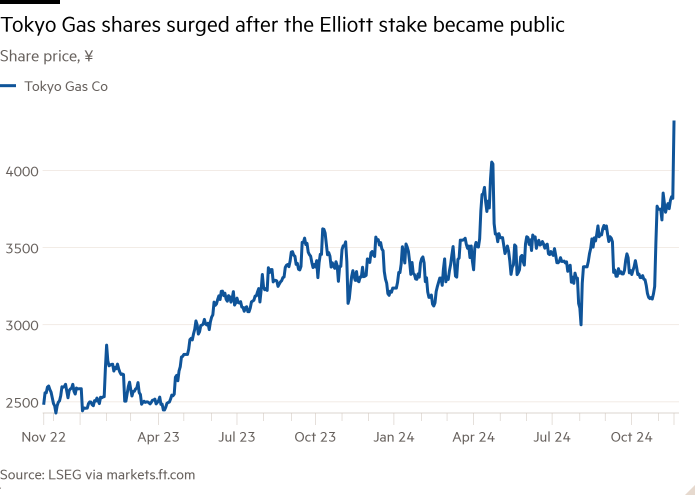Unlock the Editor’s Digest for free
Roula Khalaf, Editor of the FT, selects her favourite stories in this weekly newsletter.
More than two decades since the release of Lost in Translation, the Park Hyatt Tokyo, where the movie is set, is back in the spotlight. This time it is an activist investor calling for its sale that has put the focus back on the renowned hotel.
Shares of Tokyo Gas, the owner of the Park Hyatt Tokyo, rose as much as 15 per cent on Wednesday after Elliott Management said it now held a 5 per cent stake in the company and may make proposals to the utility. The activist investor believes Tokyo Gas should sell properties and real estate projects, including the Park Hyatt Tokyo.
Tokyo Gas is best known as Japan’s largest gas company, accounting for about a third of the local market. It has also been expanding in North America, where natural gas demand and prices have been growing in recent years and where it has a US shale gas subsidiary.
But it also has a large property portfolio. It even has a subsidiary, Tokyo Gas Real Estate, that manages real estate. Tokyo Gas has made real estate development a key part of its current midterm management plan by tying it into its decarbonisation goals, including building a zero-carbon city.
It is not unusual for Japanese groups unrelated to the property sector to have extensive real estate portfolios. Historically, many large businesses have relied on their property portfolio to make financing easier — by taking out bank loans secured against their real estate assets. That would explain why a large chunk of local businesses are at present holding on to properties that have a book value far below their market value.

But even considering such country-specific issues, it would be a stretch to call the Park Hyatt Tokyo, which Tokyo Gas operates directly, as well as its business of leasing out real estate assets, a core part of its operations.
Indeed, now would be a good time for Tokyo Gas to consider a sale. Japan’s hotel market, worth about $6.4bn by sales, has been booming. Japanese hotel occupancy rates hit a monthly record in September, as the number of overseas tourists grew. Investments in Japanese hotels are expected to reach a record high of $4.1bn this year, according to property company JLL. Hotels in Tokyo have performed especially well with the city’s average daily rate and revenue per room at a record high this year.
Regardless of the outcome at Tokyo Gas, Elliott has rightly focused attention on the growing pile of undervalued real estate holdings at Japanese companies.










